Suhoor and Iftar Times 2023 in Dubai
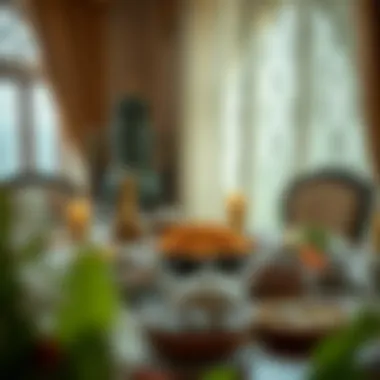
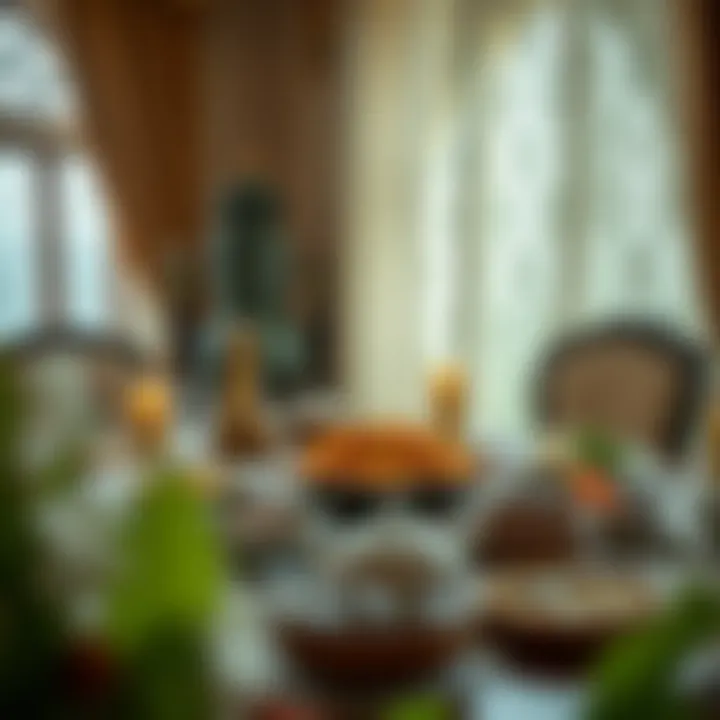
Intro
As the sun begins to set and the city of Dubai transforms under the warm embrace of twilight, the atmosphere shifts in anticipation of two cherished rituals: Suhoor and Iftar. These meals hold profound significance during the holy month of Ramadan, encapsulating a rich tapestry of cultural heritage, spiritual reflection, and community bonding.
Suhoor, the pre-dawn meal, serves as a crucial starting point before the day of fasting begins. It is not merely about nourishment; it is a time for families to come together, share stories, and set intentions for the day ahead. Meanwhile, Iftar marks the joyous moment when the fast is broken, usually celebrated with dates, water, and a spread of traditional dishes that can vary widely based on cultural backgrounds.
This guide dives into the essence of these meals—what they signify and how they fit into the lives of Dubai's diverse population. With the real estate market acting as a backdrop reflecting the ever-evolving demographic landscape, understanding these rituals becomes even more pertinent. Let's explore how the threads of tradition, timing, and community converge during Ramadan 2023 in this vibrant city.
In the sections ahead, we will dissect the timing of Suhoor and Iftar meals, look at their cultural relevance, and consider practical insights for navigating daily life during Ramadan. Let's uncover the nuances that make this month so special for those observing in Dubai.
Understanding Ramadan
Ramadan is far more than just a month marked by fasting; it is a profound time for many Muslims around the globe. This period encourages self-reflection, community engagement, and a deeper connection to faith. With the specific focus on Suhoor and Iftar, one can appreciate how these practices are woven into the fabric of Ramadan and daily life.
What is Ramadan?
At its core, Ramadan is the ninth month of the Islamic lunar calendar, observed as a month of fasting, prayer, and reflection. For adherents, it serves as a commemoration of the first verses of the Quran being revealed to the Prophet Muhammad. During this month, Muslims abstain from food, drink, and other physical needs from dawn until sunset.
But Ramadan manifests differently across cultures. The contemplative essence of this month brings families and communities closer. Various traditions can be seen, whether it's the pre-dawn meal known as Suhoor, or the evening meal of Iftar, where the fast is broken. Ramadan not only impacts the soul but reverberates throughout communities, shaping social structures and relationships.
Significance of Suhoor and Iftar
Suhoor is the pre-dawn meal that provides vital nourishment before the fast begins. It is more than simply filling one's stomach; it represents a moment of mindfulness in preparation for the day ahead. Whether it consists of a hearty plate of eggs or a light smoothie, what matters is that it fuels one’s spirit and physical endurance through the long hours of abstention. This meal fosters a sense of unity, as families gather together to indulge in conversations, share stories, and express gratitude for the food provided.
On the other end of the fasting cycle sits Iftar, which holds equal importance. This is the moment when the day's fast is broken, often festively and with joy. Traditionally, dates and water are consumed first, in accordance with the Sunnah of the Prophet. Then, meals often resemble a feast, with dishes that differ by region. Friends and family gather to partake in this communal experience, enhancing feelings of togetherness.
"During Ramadan, one's heart yearns not just for food but for the warmth of connection and understanding among peers."
The significance of Suhoor and Iftar transcends mere sustenance. They symbolize a collective effort in spiritual growth, reinforcing bonds among individuals and communities. Recognizing the timing of these meals is essential, especially for those living in a fast-paced environment like Dubai, where diversity plays a crucial role. The interactions observed during these meals bring about a cultural richness that can deepen one's understanding of Ramadan.
As we continue to explore the customs of this month, it becomes clear that understanding the intricacies of Ramadan is vital—especially for investors, homeowners, and expatriates in regions where these practices flourish. Having awareness of such traditions not only fosters mutual respect but enhances the appreciation for the cultural richness that surrounds life during this sacred month.
Cultural Practices Around Suhoor and Iftar
The rituals of Suhoor and Iftar extend beyond mere sustenance during Ramadan; they encapsulate cultural relevance and community bonds. For many, these meals represent a blend of spiritual reflection and social connection. They are times when friends and families come together, fostering a sense of unity that is particularly important during this holy month. Delving into the cultural practices surrounding Suhoor and Iftar reveals how deeply ingrained these customs are in the heart of communities, especially in buzzing places like Dubai.
Traditions of Suhoor
In the early hours before the fast begins, Suhoor holds more than just nutritional value. Traditions associated with this pre-dawn meal often vary among families and communities. Many believe that sharing this meal encourages family bonding. For instance, some families might gather around the table, engaging in conversation and prayer, extending the feeling of togetherness.
Among traditional foods served, items like foul medames, scrambled eggs, and fresh dates are common, serving not only to nourish but to link the past with the present. In homes, you might find preparations starting the night before, with care taken in selecting wholesome ingredients that will sustain energy throughout the day. Cooking is often a communal effort, where everyone plays a role, whether it’s prepping specific dishes or setting the table.
Iftar Customs
As the sun sets, the anticipation for Iftar creates an atmosphere filled with excitement. The act of breaking the fast is surrounded by special customs that vary widely from family to family. In many cultures, it is traditional to break the fast with dates and water, as practiced by the Prophet Muhammad. This practice is not just a physical act but also symbolizes spiritual renewal.
Following the simple yet significant first bites, a lavish spread often follows. Each community brings its unique flair—laying out a feast that can include samosas, biryani, lentil soup, or regional specialties. These meals can last for hours, with dishes being passed around, stories shared, and bonds strengthened. It’s also common for families to invite neighbors or friends to join, reinforcing social links and compassion.
Community Gatherings
During Ramadan, the spirit of community shines brightest during Suhoor and Iftar. Mosques and community centers often host large gatherings where families can come together and eat as one. These events are significant, especially for expatriates, as they provide a taste of home and a chance to connect with others sharing similar experiences.
The shared atmosphere promotes a collective spirit of giving. Many individuals take it upon themselves to sponsor an Iftar meal or donate food boxes to those in need. This reflects a broader cultural philosophy of charity during Ramadan, showcasing the community’s commitment to supporting each other.
Such gatherings reinforce the principle that Ramadan is not only about fasting but also about coming together, supporting one another, and cultivating a sense of belonging.
"Ramadan is a time for reflecting on what binds us, as much as what nourishes us."
These cultural practices around Suhoor and Iftar highlight the essential fabric of social life in communities observing Ramadan. In Dubai, where the demographics are incredibly diverse, these experiences become even richer and more complex, as they come together in a vibrant tapestry of traditions and values.
Timing of Suhoor and Iftar in


The timing of Suhoor and Iftar holds a pivotal role during Ramadan, shaping not just daily routines but also contributing to the collective spiritual experience of the month. Understanding the exact timings allows individuals observing the fast to engage fully in the religious and cultural significance of these meals.
Calculating Suhoor Times
Calculating Suhoor times can appear complex, but it boils down to a few straightforward considerations. The pre-dawn meal, Suhoor, must be completed before the Fajr prayer, which marks the beginning of the fast. Here’s a breakdown of how you might determine when to eat:
- Local Prayer Times: Many communities provide resources or apps that display exact prayer times. For instance, the Islamic Society of North America (ISNA) offers accurate prayer time calculations for different regions.
- Personal Preferences: Some individuals might choose to wake earlier to have extra time for eating or performing additional prayers. The philosophy of starting the day with a nourishing meal is ingrained deeply in the practice of Suhoor.
- Timing Adjustments: In 2023, daylight savings may affect local time calculations. Hence, check local timings carefully to make sure your Suhoor is in sync with the sunrise.
Here’s an example breakdown:
- Fajr Time in Dubai: 5:00 AM
- Recommended Suhoor End Time: By 4:45 AM to allow for prayer time preparations.
This ensures individuals are ready to transition smoothly into the day of fasting.
Iftar Timing Methodology
As the sun sets, the anticipation for Iftar builds. This meal holds much more than just hunger relief; it's a moment of community, faith, and gratitude. Understanding the methodology behind Iftar timing is crucial for maximizing the experience, and it largely hinges on two factors:
- Sunset Timing: Iftar begins precisely at Maghrib, which occurs at sunset. Utilizing apps or local Islamic authorities provides the exact time to break fast. Popular platforms such as IslamicFinder or Umm al-Qura offer location-specific information.
- Cultural Adaptations: In various cultures, the way individuals break their fast may include certain traditions – dates, water, and sometimes a light soup. Knowing when to break the fast is essential for adhering to these rituals, adding a layer of connection to one's roots and community norms.
Key Points in Iftar Timing
- Exact Sunset: Typically, the Maghrib prayer signals Iftar. For 2023 in Dubai, it is important to consider daily variations in sunset times, which can shift. For example, on the first day of Ramadan, sunset may be around 6:30 PM, compared to later days when it might occur at 6:45 PM.
- Community Signals: Many communities will also use cannon blasts or sounds from mosques to alert individuals when the fast can be broken, enriching the communal aspect of the meal.
Remember, timing for both meals isn’t merely about hunger and thirst; it's about spiritual readiness and community connectedness that enriches the fasting experience.
By understanding these timings and their significance, individuals can embrace Ramadan more fully, aligning their physical sustenance with their spiritual aspirations.
Suhoor and Iftar in Dubai
In the fast-paced and vibrant city of Dubai, the observance of Suhoor and Iftar takes on unique significance. It’s not just about breaking fast - it’s a cultural experience contributing to the social fabric of a diverse community. As the sun sets or rises, Dubai transforms into a hub of culinary delights and spiritual reflection, marking the essence of Ramadan throughout the city. These moments reflect a blend of tradition and modernity, inviting residents and visitors alike to gather and partake in this sacred ritual.
Local Variations in Timing
The timing of Suhoor and Iftar varies across Dubai, influenced by geographical nuances and the urban landscape. While some neighborhoods might prompt locals to wake with the first call of Fajr for Suhoor, others may adjust based on the convenience of local mosques' timing announcements. Generally, Iftar is precisely at sunset, yet in a city with skyscrapers casting long shadows, the precise moment can differ by minutes.
Many residents rely on local prayer apps or services that provide accurate times based on their location, ensuring everyone can enjoy their meals at the right time.
"Setting your watch and calendar according to the sun is crucial in Dubai, especially during Ramadan. A minute can make the difference between hydration and hunger."
This diversity in timing not only reflects the geographical variety but also highlights the personal observance of Ramadan practices. Some may prefer communal meals in larger gatherings, prompting them to calculate Iftar around popular community spots.
Popular Suhoor Spots
Dining out for Suhoor is gaining traction in Dubai, with numerous restaurants and cafes preparing late-night or early-morning offerings to accommodate the spiritual quest for nourishment. From traditional fare to innovative dishes, there’s something to satisfy every palate.
Al Mallah in Satwa is famed for its dishes, providing an authentic taste of Middle Eastern delights. Their shawarma and freshly made falafel have become iconic pre-dawn favorites. On the opposite end of the culinary spectrum, Eauzone at the One&Only Royal Mirage presents a luxurious Suhoor experience, where the ambiance complements the flavorful dishes and refreshing beverages, enhancing the dining ritual.
Moreover, eateries like Karam Beirut offer a taste of Lebanese cuisine, serving dishes like Manakish and foul, which resonate with many who grew up enjoying these traditional meals.
Iftar Venues and Offerings
As the day fades, the buzz for Iftar ramps up. Dubai hosts a plethora of venues that skillfully blend traditional and contemporary dishes. Whether it's a five-star hotel or a humble eatery, the sights and smells of Iftar are enticing.
- Burj Al Arab is notable for its lavish Iftar buffets, offering everything from gourmet dates to exquisite desserts.
- On a different note, local favorites like Tawasol feature family-style dining, serving abundant traditional dishes that crowd tables, with locals diving into mezze platters and lamb dishes reminiscent of classic Arab hospitality.
- For a unique twist, Dubai Creek hosts Iftar tents that blend river views with cultural performances, creating an atmosphere that calls friends and families to gather around shared meals.
This variance highlights how Dubai’s diverse population embraces both tradition and innovation, creating an Iftar experience reflective of the city’s melting pot of cultures.
Practical Considerations for Suhoor and Iftar
Understanding the practical considerations surrounding Suhoor and Iftar is essential, especially in the bustling environment of Dubai, where diverse cultures intermingle during Ramadan. These aspects can make a substantial impact on the way individuals embrace their fasting journey, and they extend beyond mere meal prep or timing. Making strategic choices in how one approaches these meals nourishes not only the body but the soul as well.
Meal Preparation Tips
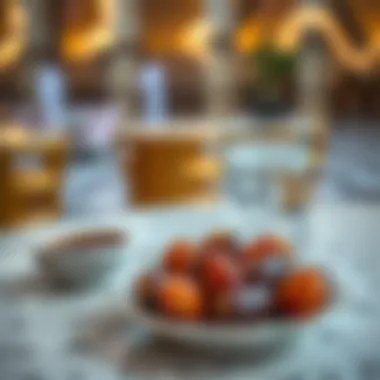
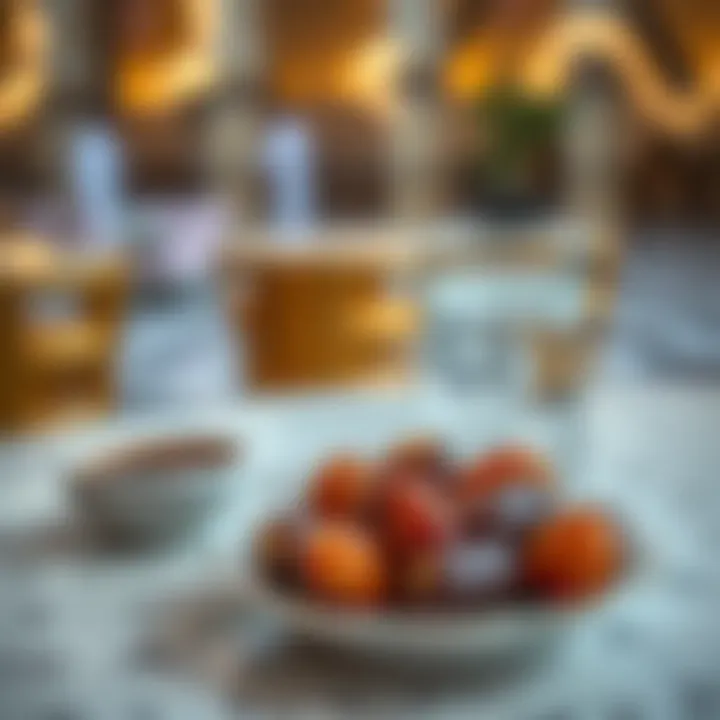
When it comes to meal preparation, planning is your secret weapon. Opting for nutrient-dense foods can set the tone for your day. For Suhoor, consider foods high in complex carbohydrates like whole grains and legumes. Quinoa, for instance, can be a powerhouse of energy that keeps you going longer. Also, incorporating hydrating fruits and vegetables, like cucumbers and watermelons, can help stave off dehydration.
Here are some tips for effective meal preparation:
- Plan in advance: Create a weekly menu. This can save time and make shopping easier.
- Cook in batches: Prepare larger quantities and store them in the fridge. This can be a lifesaver during hectic periods.
- Utilize storage wisely: Invest in good-quality storage containers to keep your meals fresh and flavorful.
Preparation doesn't have to be complex; simplicity can bring joy to your busy Ramadan days.
Balancing Nutrition
Nutritional balance is crucial during Ramadan, where the body faces the challenge of fasting. It's tempting to indulge in heavy meals during Iftar, which can lead to discomfort and sluggishness. Therefore, striking a balance between indulgence and nourishment is key.
Key elements to consider include:
- Protein Intake: Foods like grilled chicken, lentils, and dairy are valuable for muscle maintenance and satiety.
- Healthy Fats: Incorporating sources like nuts and olive oil can help with long-lasting energy.
- Portion Control: Instead of piling your plate high, savor smaller portions to allow the body to adjust. Keep in mind that overeating can lead to sluggishness, which detracts from the spiritual experience.
Indeed, a careful approach to nutrition supports overall well-being during fasting hours and aids in making the most out of the spiritual observance of Ramadan.
Timing Adjustments for Different Lifestyles
Each person’s routine can be as unique as their fingerprint, and Ramadan calls for flexibility. People balance work, family life, and religious duties in various ways, resulting in differing needs when it comes to Suhoor and Iftar timings.
For instance, individuals working traditional hours may find they need to wake up earlier for Suhoor to fuel a full workday. Conversely, those with more flexible schedules might enjoy taking their time, savoring meals without the rush.
For those with varying lifestyles, consider:
- Prioritizing Sleep: Adjust your schedule to allow for adequate rest, which is important when fasting.
- Creating a Ritual: Build a personal Suhoor and Iftar routine that aligns with your habits; whether it’s a quick meal on the go or a leisurely family dinner, find what suits your lifestyle.
- Incorporating Technology: Use apps to alert you for prayer and meal times, helping you manage your schedule better.
Ultimately, adjusting timings enhances your ability to engage meaningfully with the fasting experience. Addressing these practical considerations fosters a more mindful and fulfilling Ramadan.
The Role of Technology in Ramadan
In today's rapidly evolving world, the intersection of religion and technology lays the groundwork for vibrant transformations in how people observe practices during Ramadan. The role technology plays during this sacred month is invaluable, especially when it comes to Suhoor and Iftar. For investors, homeowners, agents, developers, and expatriates, harnessing these modern tools can greatly enhance one’s experience throughout the holy month.
With the busy lives we lead, juggling work and social obligations, technology provides timely assistance, acting as a guiding hand that helps observers navigate their spiritual journey. From scheduling prayers to ensuring precise meal timing, the benefits are vast and noteworthy. One could say technology eases the pressure of adhering to strict schedules, making this sacred month more accessible for everyone.
Apps for Prayer and Meal Times
In the context of Ramadan, mobile applications have become a lifeline. Various apps are tailored specifically for prayer and meal times, aiming to offer seamless experiences for users. Many of these apps provide notifications for Suhoor and Iftar, reminding families when to eat and when to pray. Some popular apps include:
- Muslim Pro: This widely used app not only gives you accurate prayer times but also includes the Quran, Qibla locator, and nearby halal restaurants.
- Islamic Finder: This app specializes in local prayer times based on the user's location and offers detailed information on Ramadan timings.
- My Prayer: It allows users to adjust prayer times according to their specific location and includes a range of features such as Islamic calendar events.
These tools also allow you to customize settings according to your local preferences. Just as a seasoned chef might tweak a recipe, users can amend their meal schedules to fit their particular needs, such as if they live in areas with dramatic time zone variations.
Online Resources for Planning
The digital landscape is replete with invaluable resources for proper planning during Ramadan. Various websites provide insights into cultural practices, nutritional advice, and recipes that cater specifically to Suhoor and Iftar.
- Reddit: Subreddits related to Ramadan serve as forums for sharing tips and experiences, allowing expatriates and locals to engage in community discussions.
- YouTube: Video tutorials that demonstrate how to prepare traditional Iftar dishes can be a game-changer for novices looking to embrace local culinary traditions.
- Nutritionists’ Blogs: Several health professionals maintain blogs offering specialized recommendations tailored to fasting. This guidance is especially pertinent for families wanting to balance tradition with sustenance during the month.
Leveraging these online platforms can enrich one’s understanding and appreciation of cultural nuances while helping you plan meals effectively, ultimately leading to a fulfilling Ramadan nearly tailored to everyone’s lifestyle.
"Technology, when used wisely, acts as a bridge to unify tradition with modernity, and there is much value in maintaining that connection during times of spiritual reflection."
In summary, the role of technology during Ramadan is pivotal in managing the rituals of Suhoor and Iftar. By integrating digital tools and resources, modern observers can experience a blend of age-old customs and the conveniences of contemporary life.
Emotional and Spiritual Aspects
Understanding the emotional and spiritual elements of Ramadan is vital for those who partake in its observances. This period is not solely about physical abstaining from food and drink; it dives much deeper into self-reflection, empathy, and the fostering of a community spirit. When one engages in Suhoor and Iftar, there’s an unspoken connection that transforms these meals into occasions for mindfulness and gratitude. The feelings triggered by these moments enrich the Ramadan experience, giving it a layer of significance.
Reflecting During Suhoor
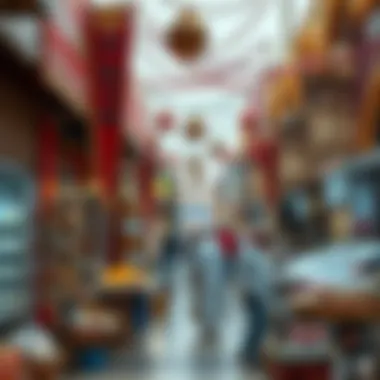
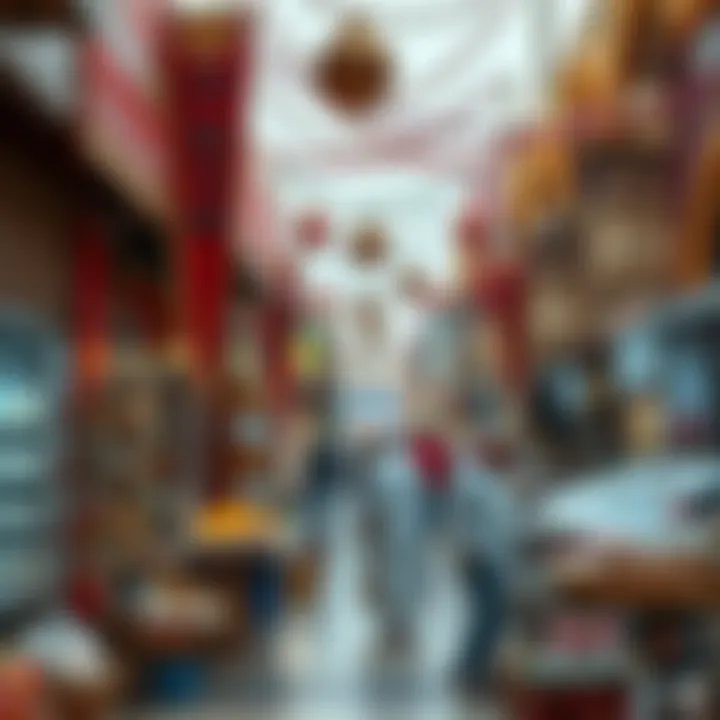
Suhoor, the pre-dawn meal, serves more than just a practical purpose of fuel before the fast begins. This time is a golden opportunity for inward reflection. Many find themselves contemplating the day ahead, setting intentions, or simply expressing gratitude for what they have. As the sun begins to rise, it marks a transition not just in the day but within oneself.
Having a quiet moment to gather thoughts can lead to a greater awareness of one’s surroundings and the challenges faced by others. It may seem trivial, but sipping a warm cup of herbal tea at this hour can evoke feelings of peace and contemplation, priming the mind for prayer and meditation.
When the food is laid out on the table, there’s often a mix of familiar dishes and new flavors, each carrying stories and traditions from generation to generation. These meals are often enjoyed with family, making the act of eating a shared experience that fosters love and unity. All in all, the hour of Suhoor translates into a moment steeped in emotional richness, preparing practitioners spiritually for the day of fasting ahead.
The Meaning of Breaking the Fast
When it comes to breaking the fast at Iftar, the emotional landscape is likewise profound. Each day, as dusk falls, there’s a notable shift in atmosphere. The anticipation that lingers in the air, as families gather around tables filled with an array of delicious foods, speaks to a powerful ritual of togetherness. Breaking the fast is not merely a physical act; it symbolizes generosity and community.
This moment of eating together brings forth feelings of joy, relief, and gratitude. People might share dates, the traditional first food eaten, and sip cool water, experiencing an almost euphoric release from the day’s restraint. It’s during these meals that one might reflect on the struggles faced during the day, not simply in relation to hunger, but also the challenges of life itself.
Moreover, Iftar often serves as a reminder of the less fortunate. Many might choose to extend the invitation to share their meal with neighbors, or even the less fortunate in their community. This act of kindness reinforces the notion of empathy and encourages a spirit of giving – a fundamental teaching of Ramadan.
"The tradition of sharing Iftar with those in need nurtures a culture of compassion and community spirit."
As such, both Suhoor and Iftar transform into more than just meals; they become profound moments of personal growth and community connectivity. They imbue Ramadan with emotional depth, where each meal bears significance beyond sustenance, cultivating a collective emotional narrative rich in shared experiences.
Future of Suhoor and Iftar Practices
In the ever-evolving landscape of Ramadan observances, understanding the future of Suhoor and Iftar practices becomes crucial, particularly for those navigating the vibrant, multicultural realm of Dubai. As society continues to progress, traditional customs are being reshaped, responding to the demands of modern life without losing the essence of these sacred rituals. After all, Suhoor and Iftar are not merely meals; they symbolize connection, reflection, and gratitude.
Adapting to Modern Lifestyles
The pace of life today is lightning fast. With busy schedules and the rise of digital connectivity, many individuals find it challenging to adhere to traditional meal timings. This has prompted a shift in how Suhoor and Iftar are approached and executed. For instance, pre-packaged Suhoor options have gained traction. Gone are the days of elaborate preparations; now, many people prefer quick, nutritious meals that can be consumed conveniently. Grocery stores and delivery apps are increasingly stocking ready-to-eat offerings that prioritize health without sacrificing time.
In addition, technology plays a significant role in shaping these practices. Apps that monitor prayer timings or remind individuals about meal times have become almost commonplace. For expatriates, these tools not only facilitate adherence but also foster a sense of community within diverse groups who may share meal preparations or traditions through social media platforms.
Moreover, flexibility is becoming the name of the game. Individuals might skip a customary large Suhoor in favor of a lighter option that suits their routine. As Ramadan welcomes an array of newcomers to Dubai, it's essential for traditional practices to embrace adaptability, thus allowing everyone to partake in the spirit of the holy month.
Sustainability in Food Choices
With the global focus on sustainability, the future of Suhoor and Iftar is also likely to reflect increased awareness of food choices and environmental responsibility. There’s a growing conversation about local sourcing ingredients, which not only supports the economy but also reduces carbon footprints associated with transportation. Markets and farms in and around Dubai are witnessing a rise in demand for locally sourced products, prompting restaurants and eateries to collaborate with local producers.
A shift towards plant-based meals is another trend on the horizon. More individuals are choosing vegetarian or vegan options for Suhoor and Iftar. This choice aligns both with health consciousness and environmental sustainability, and can lead to more balanced eating habits overall.
In essence, as the world continues to evolve, so too do the approaches to Suhoor and Iftar. With an increased focus on sustainability, communities can experience the richness of Ramadan while caring for the planet.
Another factor influencing sustainable food choices is community initiatives promoting food waste reduction during Ramadan. With many households preparing large meals for Iftar, the reality of leftovers often poses a challenge. Community programs are stepping in to address this, creating a culture where leftover meals can be shared with those in need, fostering solidarity and empathy within the community.
Epilogue
As Ramadan approaches, the significance of Suhoor and Iftar transcends mere fasting; it embodies a time for reflection, connection, and gratitude. These moments are not solely about the act of eating but instead signify a profound spiritual journey that intertwines tradition with modern life. The rituals surrounding Suhoor and Iftar foster community bonds as families and friends gather to break their fasts together. This practice is not just a routine, but a means to strengthen relationships and cultivate a sense of belonging.
Navigating the challenges presented by different lifestyles, especially in a dynamic city like Dubai, requires careful consideration of meal timings and nutritional balance. A comprehensive understanding of Suhoor and Iftar helps both residents and expatriates adapt their eating habits without compromising their health or spiritual observance.
It is essential to recognize that the traditions associated with these meals vary drastically among cultures and regions. These variations offer a rich tapestry of experiences that one can explore and enjoy, enhancing one’s appreciation of the month. Respecting local customs, while maintaining personal traditions, creates a balance that enriches the Ramadan experience for everyone.
Moreover, the adaptation of modern technology into these practices signifies a welcoming shift that can streamline planning and preparation. Whether through apps that track prayer times or resources that suggest meal plans, these innovations can simplify lives without detracting from the essence of Ramadan.
In essence, understanding the nuances of Suhoor and Iftar during Ramadan 2023 is not only beneficial for individual observance but also pivotal for nurturing communal harmony amidst the diverse demographic landscape of Dubai. By appreciating the cultural context and practical considerations, individuals can truly immerse themselves in the spirit of this holy month, adding layers of meaning to every bite they take.
Summary of Insights
Throughout this article, we’ve explored various aspects of Suhoor and Iftar that go beyond just the specific meal times. We recognized that these meals serve as essential cornerstones for fostering community spirit.
Key takeaways include:
- The importance of timing and its impact on health and spirituality during Ramadan
- Cultural variations that enrich Suhoor and Iftar experiences
- Practical tips for meal preparation that accommodate personal needs and preferences
- The role of technology in enhancing the Ramadan experience
- How sustainability finds its way into food choices during the month
Ultimately, this comprehensive guide sheds light on how Suhoor and Iftar mirror the richness of Ramadan traditions while also paving the way for modernization in an ever-evolving society.
Last Thoughts on Ramadan Celebrations
As we wrap up our examination of Suhoor and Iftar for 2023, let’s remember that these rituals are far more than a schedule to adhere to. They represent a tapestry woven from shared moments at the dining table, heartfelt prayers, and acts of kindness. Ramadan is a unique opportunity to cultivate a deeper connection with one's faith and the community.
In Dubai, this spirit of togetherness is especially pronounced, with a blend of cultures enhancing the vibrancy of the festivities. From grand communal gatherings to intimate family dinners, each Suhoor and Iftar gathering becomes a moment to cherish.
Moving forward, let us carry the lessons learned from this Ramadan into our daily lives. The values of generosity, reflection, and togetherness should not be confined to just this holy month but rather infused into our everyday routine.







